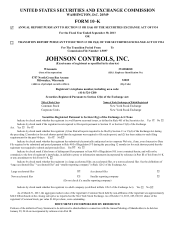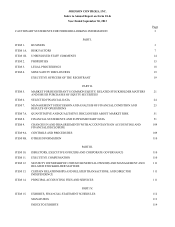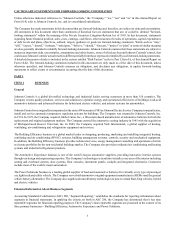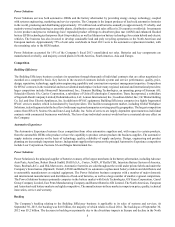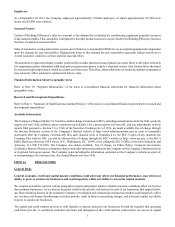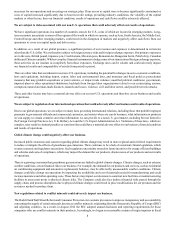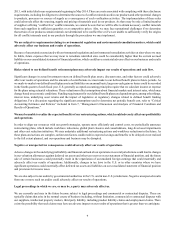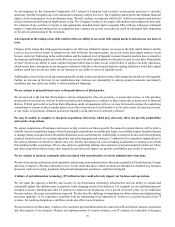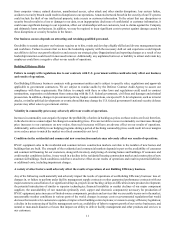Johnson Controls 2013 Annual Report Download - page 11
Download and view the complete annual report
Please find page 11 of the 2013 Johnson Controls annual report below. You can navigate through the pages in the report by either clicking on the pages listed below, or by using the keyword search tool below to find specific information within the annual report.
11
from computer viruses, natural disasters, unauthorized access, cyber attack and other similar disruptions. Any system failure,
accident or security breach could result in disruptions to our operations. A material network breach in the security of our IT systems
could include the theft of our intellectual property, trade secrets or customer information. To the extent that any disruptions or
security breach results in a loss or damage to our data, or an inappropriate disclosure of confidential or customer information, it
could cause significant damage to our reputation, affect our relationships with our customers, lead to claims against the Company
and ultimately harm our business. In addition, we may be required to incur significant costs to protect against damage caused by
these disruptions or security breaches in the future.
Our business success depends on attracting and retaining qualified personnel.
Our ability to sustain and grow our business requires us to hire, retain and develop a highly skilled and diverse management team
and workforce. Failure to ensure that we have the leadership capacity with the necessary skill set and experience could impede
our ability to deliver our growth objectives and execute our strategic plan. Organizational and reporting changes as a result of our
leadership transition could result in increased turnover. Additionally, any unplanned turnover or inability to attract and retain key
employees could have a negative effect on our results of operations.
Building Efficiency Risks
Failure to comply with regulations due to our contracts with U.S. government entities could adversely affect our business
and results of operations.
Our Building Efficiency business contracts with government entities and is subject to specific rules, regulations and approvals
applicable to government contractors. We are subject to routine audits by the Defense Contract Audit Agency to assure our
compliance with these requirements. Our failure to comply with these or other laws and regulations could result in contract
terminations, suspension or debarment from contracting with the U.S. federal government, civil fines and damages and criminal
prosecution. In addition, changes in procurement policies, budget considerations, unexpected U.S. developments, such as terrorist
attacks, or similar political developments or events abroad that may change the U.S. federal government’s national security defense
posture may affect sales to government entities.
Volatility in commodity prices may adversely affect our results of operations.
Increases in commodity costs negatively impact the profitability of orders in backlog as prices on those orders are fixed; therefore,
in the short-term we cannot adjust for changes in commodity prices. If we are not able to recover commodity cost increases through
price increases to our customers on new orders, then such increases will have an adverse effect on our results of operations.
Additionally, unfavorability in our hedging programs during a period of declining commodity prices could result in lower margins
as we reduce prices to match the market on a fixed commodity cost level.
Conditions in the residential and commercial new construction markets may adversely affect our results of operations.
HVAC equipment sales in the residential and commercial new construction markets correlate to the number of new homes and
buildings that are built. The strength of the residential and commercial markets depends in part on the availability of consumer
and commercial financing for our customers, along with inventory and pricing of existing homes and buildings. If economic and
credit market conditions decline, it may result in a decline in the residential housing construction market and construction of new
commercial buildings. Such conditions could have an adverse effect on our results of operations and result in potential liabilities
or additional costs, including impairment charges.
A variety of other factors could adversely affect the results of operations of our Building Efficiency business.
Any of the following could materially and adversely impact the results of operations of our Building Efficiency business: loss of,
changes in, or failure to perform under facility management supply contracts or other guaranteed performance contracts with our
major customers; cancellation of, or significant delays in, projects in our backlog; delays or difficulties in new product development;
the potential introduction of similar or superior technologies; financial instability or market declines of our major component
suppliers; the unavailability of raw materials (primarily steel, copper and electronic components) necessary for production of
HVAC equipment; price increases of limited-source components, products and services that we are unable to pass on to the market;
unseasonable weather conditions in various parts of the world; changes in energy costs or governmental regulations that would
decrease the incentive for customers to update or improve their building control systems; revisions to energy efficiency legislation;
a decline in the outsourcing of facility management services; availability of labor to support growth of our service businesses; and
natural or man-made disasters or losses that impact our ability to deliver facility management and other products and services to
our customers.

